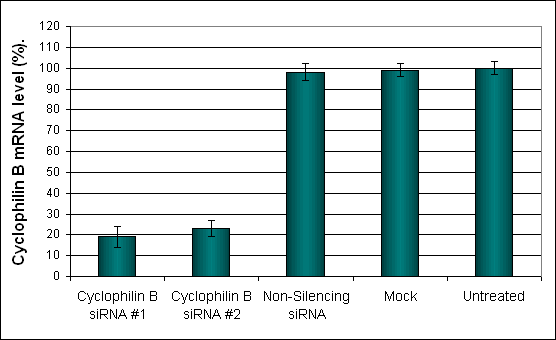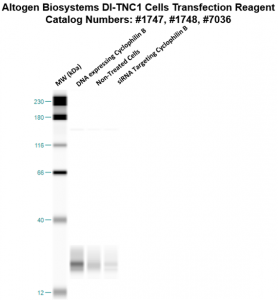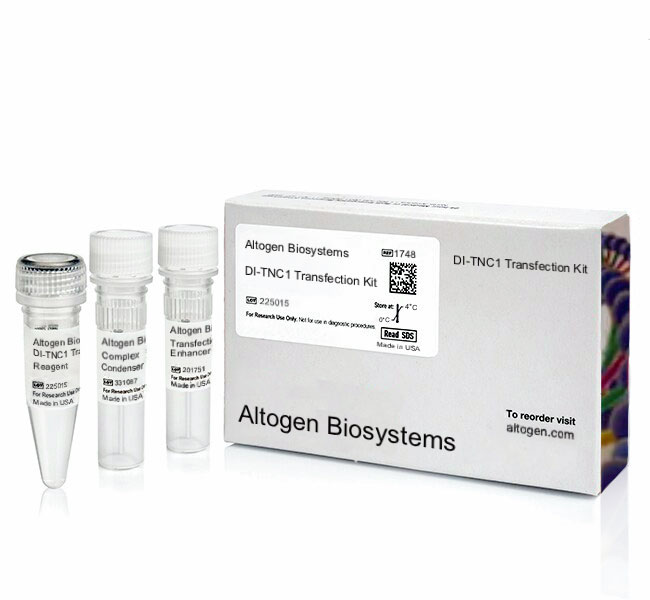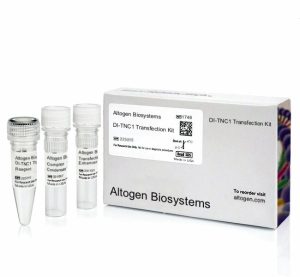Description
Purchase Orders: Click “Add to Cart” button to order, then email PO to orders@altogen.com.
Product Availability: In Stock.
Transfection Reagent for DI-TNC1 Cells (Rat Brain Astrocyte Cells)
-
A nanoparticle-based liposome formulation
-
Transfection protocols provided for transfection of proteins, DNA, mRNA, siRNA, shRNA and miRNA
-
Produce higher level of recombinant protein expression with minimal disruption of normal cell function
-
Generate physiologically relevant data you can trust
-
Effective for pDNA/siRNA co-transfection
-
Easy-to-use transfection protocol with reproducible results
-
Low cytotoxicity
-
Download DI-TNC1 transfection protocol: [PDF]
- Download DI-TNC1 CRISPR/Cas9 transfection protocol: [PDF]
-
Download PowerPoint presentation for DI-TNC1 cells transfection kit: [PPT]
- UPC/GTIN/EAN: 860002089759
-
Brand: ALTOGEN®, developed and manufactured by Altogen Biosystems
Transfection Efficiency:
Reagent exhibits at least 77% transfection efficiency of siRNA delivery. Transfection efficiency was determined by qRT-PCR.
Product Description:
High efficiency transfection reagent for DI-TNC1 cells. The DI-TNC1 cell line is commonly used in research focused on understanding brain tumors, specifically astrocytomas, and testing potential therapeutic strategies.
Transfection Protocol and SDS:
Download Altogen Biosystems DI-TNC1 Transfection Protocol: [PDF]
Download SDS: [PDF]
DI-TNC1 Cell Line:
Astrocytes are the most abundant type of cells in the central nervous system that perform a variety of different functions, including support of brain metabolism, the primary focus of which is on the relationship between astrocytes and neurons. Astrocytes are cells that promote the growth of neurons by providing nourishment and support. DI-TNC1 is derived from cultures of interbrain tissue of one-day-old rats and comprises rat brain astrocytes. Cultured astrocytes have been shown to promote neurite outgrowth by producing adhesion molecules found either on the cell surface or in the extracellular matrix. The cells retain characteristics of type 1 astrocytes including glial fibrillary acidic protein (GFAP) immunoreactivity. The DI-TNC1 cell line produces alpha 2 macroglobulin similar to amounts found in primary astrocytes but produces transferrin in much lesser amounts. Examination by immunostaining indicated SV40 T antigen was detected in the nuclei of over 95 percent of the cells. Research has shown DI-TNC1 cells exhibit many similarities to neonatal astrocytes, and the cell line is utilized in biomedical research for studying the interactions between glia and neurons, as well as astrocyte cell functions related to energy metabolism. The DI-TNC1 cells resemble astrocytes found in human infants. Neurite outgrowth is the development of any projections in young nerve cells. At the early stages of growth, it is hard to discern whether the projections are dendritic or axonic. The cells from the DI-TNC1 cell line have exhibited appreciable neurite outgrowth. Altogen Biosystems manufactures a nanoparticle-based transfection reagent kit for the DI-TNC1 rat astrocyte cell line, an essential tool in finding the cure for various brain-related diseases.
Data:

Figure 1. Cyclophilin B silencing efficiency was determined by qRT-PCR in the DITNC1 cells transfected by Cyclophilin B siRNA or non-silencing siRNA control following the recommended transfection protocol. Cyclophilin mRNA expression levels were measured 48 hours post-transfection. 18S rRNA levels were used to normalize the Cyclophilin B data. Values are normalized to untreated sample. Data are presented as means ± SD (n=6).

Figure 2. Protein expression of Cyclophilin B in DI-TNC1 cells. DNA plasmid expressing Cyclophilin B or siRNA targeting Cyclophilin B were transfected into DI-TNC1 cells following Altogen Biosystems transfection protocol. At 72 hours post-transfection the cells were analyzed by Western Blot for protein expression levels (normalized by total protein, 10 µg of total protein loaded per each well). Untreated cells used as a negative control.
Selected in vivo transfection product citations (ALTOGEN® IN VIVO Transfection Kits used in the following publications):
- Nature. 2008 454(7203):523-7. Innate immunity induced by composition-dependent RIG-I …Saito et al [PDF]
- Am J Pathology. 2010 177(4):1870-80. Role of ocular complement factor H in a murine model … Lyzogubov et al [PDF]
- Nature Biotechnology. 2011 29(4):341-5. Delivery of siRNA to the mouse brain by … Alvarez-Erviti et al [PDF]
- Cancer Research. 2011 71(15):5144-53. Inhibition of miR-193a expression by… Iliopoulos et al [PDF]
- RNA. 2010 16(11):2108-19. RNase L releases a small RNA from HCV RNA that refolds … Malathi et al [PDF]
- Diabetologia. 2012 55(7):2069-79. The p47phox- and NADPH oxidase organiser 1 … Youn et al [PDF]
- British Journal of Cancer. 2012 107(3):516-26. TIGAR induces p53-mediated cell-cycle … Madan et al [PDF]
- Hypertension. 2014 63(2):353-61. Tissue transglutaminase contributes to … Liu et al [PDF]
- Circulation Research. 2010 15;107(8). Kruppel-like factor-4 transcriptionally regulates … Cowan et al [PDF]
- Hypertension. 2012 59(1):158-66. Role of uncoupled endothelial nitric oxide synthase … Gao et al [PDF]
- Jounal of Biological Chemistry. 2012 287(4):2907. Chaperoning of mutant p53 protein … Gogna et al [PDF]
- PLoS Pathogens. 2012 8(8) Uridine composition of the poly-U/UC tract of HCV RNA … Schnell et al [PDF]
- J Proteome Res. 2012(11) Retinal proteome analysis in a mouse model of oxygen-induced … Kim et al [PDF]
- J Transl Med. 2010 15;8:133. Prevention of hyperglycemia-induced myocardial apoptosis … Zhang et al [PDF]
- Mol Cell Biol. 2013 33(7). SCO2 induces p53-mediated apoptosis by Thr845 phosphorylation … Madan et al [PDF]
- Hypertension. 2015 65(2):430-9. Neurokinin 3 receptor and phosphocholine transferase… Parchim et al [PDF]
- Gastroenterology. 2011 141(2) Differential type I interferon-mediated autophagic trafficking … Desai et al [PDF]
- PLoS Pathog. 2014 10(10) Exosomes from hepatitis C infected patients transmit HCV … Bukong et al [PDF]
Altogen Biosystems is a life sciences company that offers cell type-specific and pre-optimized transfection products, elecroporation kits, and in vivo delivery reagents. Advanced formulation of reagents and optimized transfection protocols provide efficient intracellular delivery of protein, DNA, mRNA, shRNA and siRNA molecules. Read more about transfection technology at Altogen’s Transfection Resource. Altogen Labs provides safety and efficacy preclinical research services. GLP-compliant studies for IND applications, and drug development, including over 90 in-house validated xenograft models, safety toxicology, etc (visit AltogenLabs.com).
Volume Options:
- 0.5 ml (Catalog #1747)
- 1.5 ml (Catalog #1748)
- 1.5 ml CRISPR (Catalog #2138)
- 8.0 ml (Catalog #7036)
Purchase Orders: Click “Add to Cart” button to order, then email PO to orders@altogen.com.
Product Availability: In Stock.






